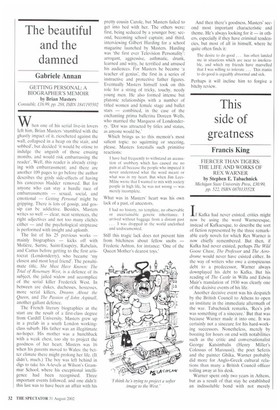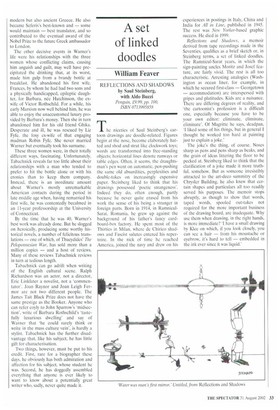This side of greatness
Francis King
FIERCER THAN TIGERS: THE LIFE AND WORKS OF REX WARNER by Stephen E. Tabachnick Michigan State University Press, £30.99, pp. 522, ISBN 087013552X If Kafka had never existed, critics might now be using the word Warneresque, instead of Kafkaesque, to describe the sort of fiction represented by the three remarkable early novels for which Rex Warner is now chiefly remembered. But then, if Kafka had never existed, perhaps The Wild Goose Chase, The Professor and The Aerodrome would never have existed either. In the way of writers who owe a conspicuous debt to a predecessor, Warner always downplayed his debt to Kafka. But his reading of The Castle in Willa and Edwin Muir's translation of 1930 was clearly one of the decisive events of his life.
Another decisive event was his despatch by the British Council to Athens to open an institute in the immediate aftermath of the war. Tabachnick remarks, 'Rex's job was something of a sinecure.' But that was because Warner made it into one. It was certainly not a sinecure for his hard-working successors. Nonetheless, merely by boozing for hours on end with notabilities such as the critic and conversationalist George Katsimbalis (Henry Miller's Colossus of Maroussi), the poet Seferis and the painter Ghika, Warner probably did more for Anglo-Greek cultural relations than many a British Council officer toiling away at his desk.
Warner spent only two years in Athens, but as a result of that stay he established an indissoluble bond with not merely modern but also ancient Greece. He also became Seferis's best-known and — some would maintain — best translator, and so contributed to the eventual award of the Nobel Prize to the future Greek ambassador to London.
The other decisive events in Warner's life were his relationships with the three women whose conflicting claims, causing him anguish and guilt, may well have pre cipitated the drinking that, at its worst, made him gulp from a brandy bottle at breakfast. He abandoned his first wife, Frances, by whom he had had two sons and a physically handicapped, epileptic daughter. for Barbara. née Hutchinson, the ex wife of Victor Rothschild. For a while, his early Marxism now well behind him, he was able to enjoy the unaccustomed luxury pro vided by Barbara's money. Then she in turn abandoned him for his old friend Ghika. Desperate and ill, he was rescued by Liz Fyfe, the foxy ex-wife of that engaging madman Robin Fyfe. She never married Warner but eventually took his surname.
These three women were, in their totally different ways, fascinating. Unfortunately, Tabachnick reveals far too little about their relationships with a man who tended to prefer to hit the bottle alone or with his cronies than to keep them company.
Instead, there is an inordinate amount about Warner's mostly unremarkable American contacts during the period in late middle age when, having remarried his first wife. he was contentedly becalmed in an 11-year professorship at the University of Connecticut.
By the time that he was 40, Warner's best work was already done. But he slogged on heroically, producing some worthy his torical novels, a number of felicitous translations — one of which, of Thucydides' The Peloponnesian War, has sold more than a million copies — and a host of reviews. Many of these reviews Tabachnick reviews in turn at tedious length.
Tabachnick can go adrift when writing of the English cultural scene. Ralph Richardson was an actor, not a director,
Eric Linklater a novelist, not a 'commentator'. Joan Raynor and Joan Leigh Fer matare not two different people. The
James Tait Black Prize does not have the same prestige as the Booker. Anyone who can refer coyly to John Sparrow's 'midsec tion', write of Barbara Rothschild's 'tastefully luxurious dwelling' and say of Warner that 'he could rarely think or write in the mass culture vein', is hardly a stylist. Tabachnick has the further disadvantage that, like his subject, he has little gift for characterisation.
Two things, however, must be put to his credit. First, rare for a biographer these days, he obviously has both admiration and affection for his subject, whose student he was. Second, he has doggedly assembled everything that anyone is ever likely to want to know about a potentially great writer who, sadly, never quite made it.



























































 Previous page
Previous page